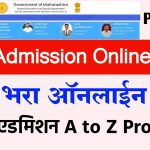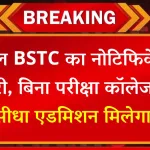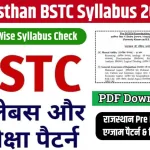The BSTC (Basic School Teaching Course) syllabus is designed for candidates preparing for the Pre D.El.Ed (Diploma in Elementary Education) exam, which is a state-level entrance test for admission to the D.El.Ed program in Rajasthan.
The syllabus covers various sections aimed at assessing the candidate’s knowledge, mental ability, general awareness, and teaching aptitude. Below is the full and complete syllabus for BSTC:
Section 1: Mental Ability
This section tests the candidate’s reasoning and cognitive abilities.
- Analogy: Questions based on similarity between two situations, sequences, or relationships.
- Reasoning: Logical reasoning, including both verbal and non-verbal reasoning.
- Discrimination: Identification of differences in shapes, patterns, and objects.
- Relationship: Understanding relationships between pairs or groups.
- Analysis: Analytical ability to break down information and find solutions.
- Logical Thinking: Application of logic to solve problems or identify correct reasoning.
Section 2: General Awareness
This section assesses the candidate’s knowledge of current events and general knowledge.
- Historical Aspect: Questions related to Indian history and culture, significant events, and personalities.
- Political Aspect: Basic knowledge of Indian political structure, the Constitution, governance, and rights.
- Art, Culture, and Literature: Awareness of Indian art forms, culture, literature, and famous personalities in these fields.
- Economic Aspect: Understanding of the basic economic structure of India, economic policies, and current affairs.
- Geography: General knowledge of Indian and world geography, major physical features, and environmental concerns.
- General Science: Basic understanding of science topics, including biology, chemistry, and physics.
- Other events: Current affairs, sports, awards, and important events at the national and international levels.
Section 3: Teaching Aptitude
This section tests the candidate’s potential as a teacher.
- Teaching Learning: Understanding of basic concepts related to teaching and learning processes.
- Leadership Quality: Ability to lead, motivate, and manage a classroom effectively.
- Creativity: Use of innovative and creative teaching methods.
- Continuous and Comprehensive Evaluation: Knowledge of modern evaluation techniques used in teaching.
- Communication Skills: Effective communication skills required for teaching.
- Professional Attitude: Ethical considerations and professional behavior in a teaching environment.
- Social Sensitivity: Awareness of social issues and sensitivity towards the diversity in the classroom.
Section 4: Language Ability
This section tests proficiency in language and communication.
Hindi
- हिंदी व्याकरण (Grammar): Basic grammar, sentence structure, and correct usage.
- शब्दावली (Vocabulary): Word meanings, synonyms, antonyms, and appropriate word usage.
- मुहावरे और लोकोक्तियाँ (Idioms and Phrases): Understanding and application of idiomatic expressions.
- समास और संधि (Compound Words and Sandhi): Knowledge of compound words and their formation.
- रिक्त स्थानों की पूर्ति (Fill in the Blanks): Completing sentences with appropriate words.
- पाठ्यांश (Comprehension): Understanding and interpreting a given passage.
English
- Grammar: Understanding basic grammatical rules, sentence structure, and usage.
- Vocabulary: Building a strong vocabulary, including synonyms, antonyms, and correct usage.
- Comprehension: Reading and interpreting passages to answer related questions.
- Sentence Completion: Completing sentences using correct grammar and vocabulary.
- Error Detection: Identifying and correcting grammatical errors in sentences.
Sanskrit
- संधि एवं समास (Sandhi and Samas): Understanding of word combinations and formations in Sanskrit.
- प्रत्यय एवं उपसर्ग (Suffixes and Prefixes): Knowledge of common suffixes and prefixes.
- व्याकरण (Grammar): Basic grammar rules and sentence structure.
- अनुवाद (Translation): Translation of sentences from Sanskrit to Hindi and vice versa.
- रिक्त स्थानों की पूर्ति (Fill in the Blanks): Completing sentences with appropriate Sanskrit words.
- पाठ्यांश (Comprehension): Understanding and interpreting Sanskrit passages.
This complete syllabus provides a comprehensive guide for candidates preparing for the BSTC exam, helping them to focus on key areas and topics
BSTC Exam Pattern and Full Details
The BSTC (Basic School Teaching Course) exam, also known as the Pre D.El.Ed exam, is conducted for candidates seeking admission to the D.El.Ed (Diploma in Elementary Education) program in Rajasthan. Below is the complete exam pattern and details:
Exam Pattern
- Mode of Examination: Offline (Pen and Paper-based)
- Type of Questions: Multiple Choice Questions (MCQs)
- Number of Questions: 200
- Total Marks: 600
- Duration: 3 hours (180 minutes)
- Marking Scheme:
- Each question carries 3 marks.
- There is no negative marking for incorrect answers.
Section-wise Distribution of Questions and Marks
- Mental Ability
- Number of Questions: 50
- Marks: 150
- Topics Covered: Analogy, Reasoning, Discrimination, Relationship, Analysis, Logical Thinking.
- General Awareness
- Number of Questions: 50
- Marks: 150
- Topics Covered: Historical Aspect, Political Aspect, Art, Culture & Literature, Economic Aspect, Geography, General Science, Current Affairs.
- Teaching Aptitude
- Number of Questions: 50
- Marks: 150
- Topics Covered: Teaching Learning, Leadership Quality, Creativity, Continuous and Comprehensive Evaluation, Communication Skills, Professional Attitude, Social Sensitivity.
- Language Ability
- Language Sections:
- Hindi: 30 Questions, 90 Marks
- Sanskrit: 20 Questions, 60 Marks
- English: 20 Questions, 60 Marks
- Total Number of Questions: 70
- Total Marks: 210
- Language Sections:
Total Marks and Questions
- Total Number of Questions: 200
- Total Marks: 600
Exam Details
- Eligibility Criteria:
- Educational Qualification: Candidates must have passed 12th grade (10+2) or equivalent from a recognized board with a minimum of 50% marks for General category and 45% marks for SC/ST/OBC/PH categories.
- Age Limit: The candidate must be below 28 years of age. Age relaxation is provided for reserved categories as per government norms.
- Application Process:
- The application form is available online on the official website of the Rajasthan Education Department.
- Candidates need to fill in their personal details, educational qualifications, and upload necessary documents.
- The application fee can be paid online via debit/credit card or net banking.
- Admit Card:
- Admit cards are issued online and can be downloaded from the official website using the registration number and password.
- Result:
- The results are declared online on the official website.
- Candidates can check their results by entering their roll number and other required details.
- Counseling Process:
- Candidates who qualify for the exam are eligible for the counseling process.
- Counseling involves choice filling, seat allotment, document verification, and payment of the admission fee.
- Reservation Policy:
- Reservation for various categories (SC/ST/OBC/PH) is as per government norms.
- Special reservation for female candidates, ex-servicemen, and others as applicable.
- Important Tips for Preparation:
- Understand the exam pattern and syllabus thoroughly.
- Practice previous year question papers and sample tests.
- Focus on time management and accuracy during the exam.
- Stay updated with current affairs and general knowledge.
- Important Dates:
- Notification Release: Usually in March-April.
- Application Start Date: Typically in April.
- Last Date for Application: May.
- Admit Card Release: 2-3 weeks before the exam.
- Exam Date: June-July.
- Result Declaration: July-August.
- Counseling: August-September.
Contact Information
For any queries or further information, candidates can contact the Rajasthan Education Department through their official website or helpline numbers provided in the notification.
Latest Posts
- Step-by-step guide to download and apply for jee mains admit card 202
- Comprehensive 2025 government holidays and recruitment details for job seekers
- JEE Mains Admit Card 2025: Your Step-by-Step Guide to Downloading the Hall Ticket
- Everything You Need to Know About 2025 Government Holidays Recruitment
- Comprehensive Guide to rrb d group recruitment 2025 – Eligibility, Vacancies, and Application
- Detailed guide to nps trust recruitment 2025 vacancies, eligibility and apply process
- Comprehensive guide to hpcl recruitment 2025 notification, vacancies, and application process
- ignou bed admission 2025 complete recruitment guide with eligibility and process
- Comprehensive Guide to Indian Army Agniveer Recruitment 2025 Notification and Jobs
- Everything You Must Know About CBSE Board Exams 2025 Changes & New Rules




